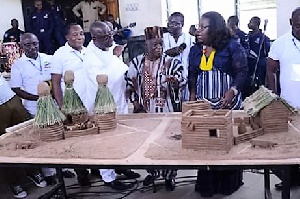- Home - News
- TWI News | TV
- Polls
- Year In Review
- News Archive
- Crime & Punishment
- Politics
- Regional
- Editorial
- Health
- Ghanaians Abroad
- Tabloid
- Africa
- Religion
- Election 2020
- Coronavirus
- News Videos | TV
- Photo Archives
- News Headlines
- Press Release
General News of Thursday, 4 August 2016
Source: The Enquirer
We will leap the poor out of poverty – Oye Lithur
Data collection of the Ghana National Household Registry (GNHR) will be a game changer in the fight against poverty in the country, Nana Oye Lithur, Minister of Gender, Children and Social Protection has said.
She said data from the registry will be used for public policy planning as well as research and development in social protection for the poor, vulnerable and excluded in society.
Oye Lithur was speaking at the launch of the data collection exercise of the GNHR at Wa in the Upper West Region. The exercise which was on the theme “Single Household Registry: Towards Improving Efficiency in Social Protection” targets 112,000 households in the Upper West Region. It was chaired by Naa Dr. Ernest Sangsor-Tulong l, a traditional leader of the area.
The exercise is the first in the sub-region aimed at coordinating all the social protection interventions implemented in the country. Oye Lithur reiterated that government is very much committed to social inclusion, saying it will work hard to ensure that social protection programmes reach persons who really need it, especially the vulnerable.
“We will LEAP the poor out of poverty” she said, adding “I am delighted at this commencement of Data Collection nationwide and I assure you that under the strong leadership of His Excellency John Dramani Mahama, we will continue to work to change lives and ultimately transform Ghana”, she stated.
Oye Lithur explained that the data collection of the GNHR is the first of its kind in the sub-region and it will ensure that the beneficiaries have a face, a name, an address, and social-economic characteristics of households in Ghana.
“I am especially delighted because the first phase of the data collection is set to enumerate approximately 112,000 households here in the Upper West Region”, she said.
The initiative, Oye Lithur said is in fulfillment of the manifesto promise that as a social democratic government develops an integrated programme for the registration of all persons into a common database for social protection.
Government’s vision for social protection, she said is to promote the well-being of Ghanaians through an integrated platform of effective social assistance, social and productive inclusion, social insurance, and financial access to social services. “We aspire to mitigate and reduce vulnerabilities, close the inequality gap and ensure total inclusion for all Ghanaians”, she pointed out.
Mr. Robert Austin, National Coordinator for GNHR, said they were established a little over a year ago with the clear mandate to compile a credible single household register for social programs for Ghana with funding to complete the register for the Upper West, Upper East and Northern Regions by 2017.
He explained that they would be using the census approach that is the enumerator s shall move from house to house, using electronic devices to register households. “These electronic devices or tablets have the capability to take photographs, scan fingerprints and ID Cards and type in the answers of households to questions. The entire data collection will therefore be paperless. Data on each households biometrics, demographics and other socio-economic characteristics collected from the field will be transmitted directly to computers in Accra for processing”, Mr. Austin added.
In his welcome address, Alhaji Amidu Sulemani the Upper West Regional Minister said the registry is important to the region since it have the highest levels of poverty and inequality in Ghana.
He said it is therefore no coincidence that the region was chosen to pilot the exercise, adding the household data collected during the exercise will be utilized in the continued efforts to reduce poverty in the region.
“The data will indeed present an opportunity for government to be able to evaluate the successes chalked in the fight against poverty and also identify the challenges involved in the implementation of pro-poor policies”, he underscored.











